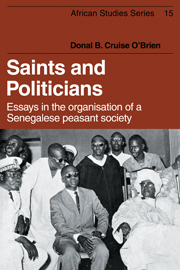4 - BUREAUCRATS AND CO-OPERATORS
The organisation of a peanut economy
Published online by Cambridge University Press: 04 August 2010
Summary
Recent rural unrest in Senegal, a series of drought years from 1968 to 1973 and a tendency to the rejection of commercial agriculture, have focused much official and even some international journalistic attention on the predicament of the (largely Wolof) peasantry. The fate of Senegal's peasant farmers was of course first decreed by nature, which endowed Senegal with soils so poor as to leave little practical alternative to the peanut as a source of export revenue. Stagnant or declining world market prices for this staple export (accounting consistently for some four fifths of total export value) have not helped. Consequent economic difficulties are in turn gravely exacerbated by a rapid rise in population (officially 2.5% per annum nationally, quite possibly more for the peanut region of the north-west). This causes overcrowding on the land, with over-cultivation and soil exhaustion, and so stimulates migration to towns and cities which can provide few employment outlets.
The Wolof peasantry (who produce two thirds of Senegal's peanut crop) are thus faced with a situation over which their control is necessarily limited, at least for the present and the immediate future. Yet these broad constraints – ecological, demographic, market-economic – for all their ultimate importance, do not in themselves provide anything like a full explanation of the present situation of rural economic crisis and unrest.
- Type
- Chapter
- Information
- Saints and Politicians , pp. 113 - 146Publisher: Cambridge University PressPrint publication year: 1975



